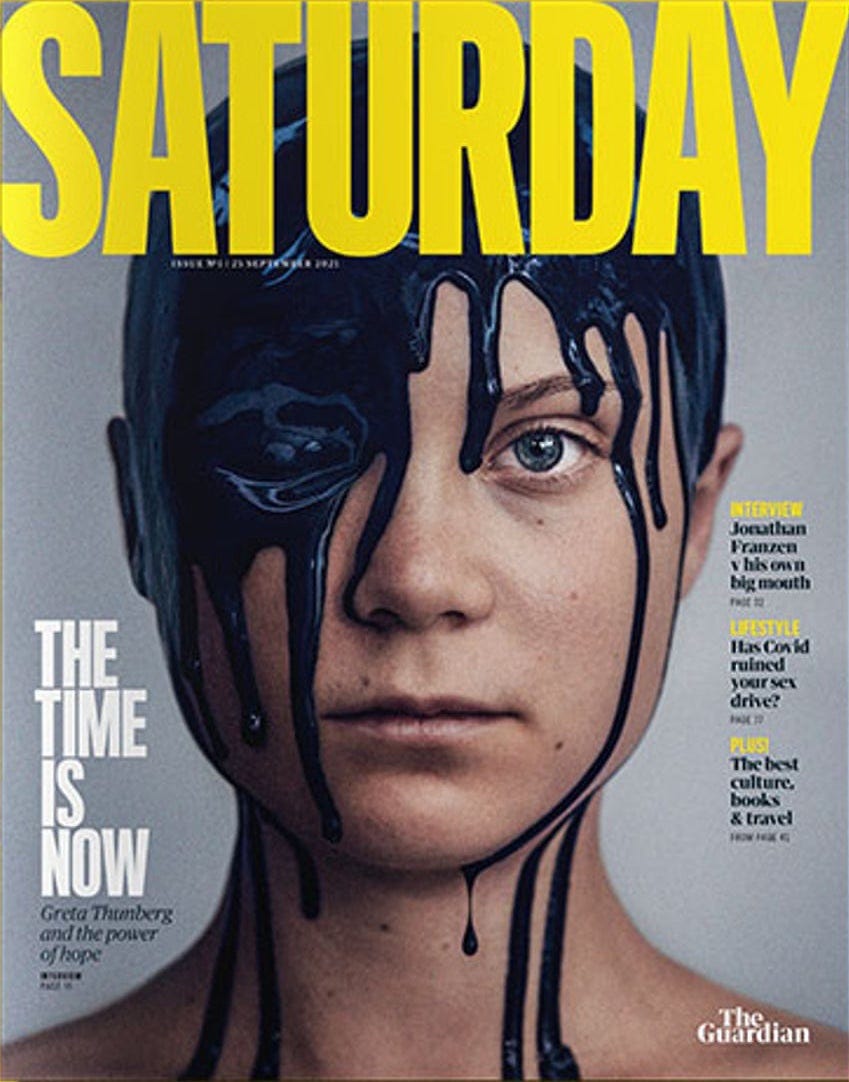Maybe Zuck is right
Cover love, deconstructing the metaverse, Nerd Wallet, Solo Brands, MSCHF.
Welcome to People vs Algorithms #4.
I look for patterns in media, business and culture. My POV is informed by 30 years of leadership in media and advertising businesses, most recently as global President of Hearst Magazines, one of the largest publishers in the world.
First glance: the love of a cover
Covers still matter. Despite print’s sagging fortunes, the cover remains one of the few places in an atomized media world where we can freeze time, frame the moment and say “this is important”. Its cultural importance has always eclipsed a magazine’s scale as a media vehicle — and as a business. Less beholden than an advertisement, it persists as a unique art form, a wonderful juxtaposition of concept, celebrity, words and design.
We’ve seen a lot of amazing examples that tell the story of our crazy Covid years. I’ve picked a few that stood out to me.
The march to the metaverse
The metaverse has rocketed from science fiction concept to popular conversation over the past week or two, thanks to the Facebook announcement that it would change its name to Meta and dump billions of dollars into its realization.
If you are still uncertain about what the metaverse is, I will try to simplify it for you. It's where you go if you climb through your web browser and into the internet. Or, how you navigate your digital life after the mouse, keyboard and mobile phone. According to Mark Zuckerberg, "you can think about the metaverse as an embodied internet, where instead of just viewing content — you are in it. And you feel present with other people as if you were in other places, having different experiences that you couldn’t necessarily do on a 2D app or webpage, like dancing, for example, or different types of fitness."
I never read Neal Stevenson's 1992 novel Snow Crash, where the term originated, but I did read William Gibson's Neuromancer where he coined the term "cyberspace". I will leave it to you to sort out the difference between the two.
Now, I know Facebook — ok let’s just call it Meta — is the world's favorite punching bag right now, but I feel a need to add perspective.
On Meta’s timing and ambition — this is not new. The $2.4B acquisition of Oculus 2014 signaled their early embrace of VR. They have been investing aggressively since. While this is an epic money pit and will be for the foreseeable future, it does represent their fastest growing, non-advertising revenue line. This extremely well constructed launch video shows a company who had been preparing this announcement for months.
Much of the negative public reaction to Meta comes back to distrust of Zuck. For my part I can’t help but to see him as that smart, nerdy, annoying guy from high school who returned to the class reunion as the same nerdy guy but now kinda jacked, sporting a weird emperor hair cut, wildly rich, talking like a libertarian techno-king and perhaps even more unlikeable. But that’s just me and people change. So do organizations.
Like many wildly successful companies, especially ones from Silicon Valley, their dominance comes with a special kind of “we know better and you just don’t quite get this stuff” arrogance. But this cycle has been particularly humbling for Meta and they have got to be suffering through some serious cognitive dissonance right now. For most of its history, Mark and team told themselves and the world that they were here to "bring the world closer together". Maybe things weren’t quite so kumbaya.
But, appreciate this is not a problem entirely of Meta’s making. Unlike the other tech giants, the company sits smack in the middle of the great media inversion, a politically polarized world and inside of a regulatory vacuum. Have they been sufficiently self reflective? Probably not. Are they more scary than the Google who basically controls the access point to the entire internet and it’s underlying ad ecosystem? Google may come off as more likable, in a sort of friendly academic way, but underneath they both are highly competitive, opportunistic profit-driven entities. These companies have a ton of market power and they all deserve scrutiny.
Is the business model to blame? Perhaps. But please be realistic about how hard it is to navigate away from this, particularly when you are the communication backbone for much of the world and the marketing engine for more than 10 million businesses.
But I do need to quickly point out Zuck’s performance in the Meta launch video... it was decent, don't you think? He was much less wooden and almost likable. Maybe even better than Tim Cook standing awkwardly in the long, designer grasses outside Apple headquarters? Microsoft CEO Satya Nadella's performance this week was conventional, credible if a bit boring. But the accent certainly helped. And the Oscar for best corporate launch presentation goes to...
All that said, mistakes were made and Meta is eager to write a new chapter. The metaverse is the obvious narrative vector as a successor to social media. But it’s the long-term business rationale that is the real motivator. Reliance on Apple and Google’s smartphone operating systems is becoming a major distribution issue. Shira Ovide, the writer of The Times’s newsletter On Tech, describes the problem well:
It gives Zuckerberg more control over Facebook’s — sorry, Meta’s — future. What Zuckerberg said at the unveiling yesterday is that Facebook has been under the thumb of smartphone developers, mostly Apple, but also Google. The social networking giant has lost some of its authority over the products it creates. Now, it is building a world that it controls. It is the operating system.
Better yet, this from venture capitalist Matt Ball’s excellent 2020 essay on the metaverse:
Even if the Metaverse falls short of the fantastical visions captured by science fiction authors, it is likely to produce trillions in value as a new computing platform or content medium. But in its full vision, the Metaverse becomes the gateway to most digital experiences, a key component of all physical ones, and the next great labor platform.
So it probably makes sense to double down. And few will have the wherewithal to build an on-ramp to metaverse like Meta can. The hardware complexity is immense and will require sustained unprofitable investment. Few if any have the founder commitment, technical sophistication, identity expertise and patience to succeed.
The metaverse will not just be about playing online ping pong with your friends. It really only moves beyond novelty if we figure out a seamless connection between meat and virtual space — how our identity extends online and becomes the basis for a better form of communication and connection than we have now. Meta is investing heavily here — they call this "presence". It’s how identity is manifested in the virtual world — the mapping of gestures and eye movement, how we move and interact, how clothing fits, etc.
We ought to be skeptical of any single company’s ownership of our virtual spaces. When pressed on the issue of “interoperability” Zuck responded: “I think a good vision for the metaverse is not one that a specific company builds, but it has to have the sense of interoperability and portability. You have your avatar and your digital goods, and you want to be able to teleport anywhere. You don’t want to just be stuck within one company’s stuff.”
We do not need to take him at his word. Anything that feels proprietary will be a non-starter this time round. Call me naive but our collective embrace of blockchain’s principles of decentralization and transparency will not be undone by Meta.
It's easy to be dismissive of this stuff, especially if you have spent time wearing an Oculus headset. Hardware is a big challenge but it’s evolving quickly. This will be a ten to twenty year progression — first to AR and mixed reality technologies that begin to map physicality into virtual — like Mesh, recently announced from Microsoft. There are forces pushing this forward beyond technology — the ubiquity of social platforms, gaming's cultural ascendance, a digitally native financial system and the principles embodied in Web 3.0.
And, I don’t think the metaverse is singular — there will be a multitude, each with specific use cases and subcultures. Roblox, Habbo, Fortnight, Axie, Discord are all part of the fabric of the next world. The rise of a digitally native economy via crypto and blockchain is a necessary building block and accelerant. After all, we are going to need virtual wall space for NFTs.
Know that you are already one foot in, you just don't call it the metaverse yet. Consider some of the in-between places. Peleton is a good example. It's a screen and a community and a virtual identity. Here the input device is the bike. Your car is an in-between space where screens are becoming more important than your windshield. Zoom, Teams, Google Meet are all in-between spaces, all adding fidelity in with avatars, directional audio and collaboration spaces. Not to be outdone by Meta, this week Microsoft showed its next vision for Teams, aimed at removing barriers between physical and virtual representation. The metaverse is everywhere. Even Twitter is going meta. Shorty you will be able to connect your crypto wallet to your profile and show off your NFT collection.
All of this goes far beyond gaming. This is about next generation socialization, how we work together, exercise and learn. But popularization will require training wheels. This is where Meta will have an edge — user friendly hardware and the underlying data that connects you and your friends. Even more important will be keeping the metaverse safe and clean — a competency few have at scale. Today Meta has 30,000 people and more than 1000 engineers dedicated to content review and community management. Today’s challenges will pale in comparison to what comes with full immersion. Second Life, a pioneering virtual world is a case study in the challenges of managing human weirdness. "Second Life in a virtual child sex scandal" read a headline in the Guardian 15 years ago.
Shaan Puri sums it up much better than I could. Here's most of his Twitter thread.
The metaverse is the moment in time where our digital life is worth more to us than our physical life.
This is not an overnight change. Or an invention by some steve jobs type.
It's a gradual change that's been happening for 20 yrs
Everything goes digital. Your friends, your job, your identity.
And now with crypto, your assets are online too.
Bored Apes are the new Rolex.
Fortnite skins are the new skinny jeans.
If everyone hangs out online all the time, then your flexes need to be digital.
So if you play this forward another 10-20 years — we will cross into the metaverse
The moment in time where digital matters more to us than physical.
Our attention used to be 99% on our physical environment.
TVs dropped that to 85%
Computers down to 70%
Phones.. 50%
Soon, some company will make smart glasses that sit in front of our eyes all day.
We will go from 50% attention on screens to ~90%+
That's the moment in time when the metaverse starts.
Because at that moment, our virtual life will become more important than our real life.
Feeling like I needed more historical context to understand technology’s progression, I decided to look back at the original “metaverse” and stumbled on a 1999 New York Times profile entitled AOL, Now Everywhere. That year saw AOL at its height. 39% of America's time spent online was with AOL or a service it controlled. Its $5B in revenue was more than the next 20 largest internet companies combined and its $125B market cap exceeded any other media concern in the world. Steve Case proclaimed AOL would be the next Microsoft and the service would subsume all other media.
As I lay on my couch reading on my super-computer powered mobile phone, I contemplated ordering basically anything under the sun from the elegantly designed Uber Eats app with convenient suggestions from its clever AI, AOL’s now 20 year old prognostications about the future stood out to me:
One feature inspiring high hopes here is called You've Got Pictures, a joint effort with Kodak to let people send snapshots by E-mail. Another is My Calendar, which lets users keep their appointment books on line. But why bother, when a hand-held electronic organizer — or a paper calendar — may be simpler? As always, the answer is communication. The service will let a group arrange the soccer carpool by bringing together all the drivers' schedules.
Ha ha... Sending pictures? Group calendaring?
Yes Ferris, life… and tech moves pretty fast, if you don't stop and look around you might miss it.
Have a great weekend…/ Troy
Bonus Tracks
1. S1 scan
Nerd Wallet will start trading today at a valuation around $1.25B. This is an amazing story for a company with about 20M uniques, but one focused on a high value category and the right place in the funnel. Interestingly, in the first half of 2021 the company spent $151M in sales and marketing, 84% of the $182M revenue in that period. Of this over 40% was for brand marketing.
Solo Brands went public at just over $2B last week under the symbol DTC. The company, driven by the Covid famous outdoor fire pit Solo and fratty shorts brand Chubbies will probably do just under $300M in sales this year (84% direct) and an impressive EBITDA margins over 30%. The secret here - COGS discipline. I know the Cubbies business well - they are smart operators.
2. Commerce needs membership
Fan Duel and Draft Kings both submit offers to acquire subscription-based sports media company, The Athletic. The opportunity to bundle content, membership and betting seems obvious. See People vs Algorithms #3.
3. A Warhol by any the name
Notorious pranksters, MSCHF (most recently for injecting Nike Air Max with blood in a collaboration with Lil Nas X entitled “Satan’s Shoes”) just launched Museum of Forgeries. This time they bought the original Warhol “Fairies”, made 999 replicas and are selling all of them off for $250 each. Included in the sale is the original - but no one will ever know which it is.
By forging Fairies en masse, we obliterate the trail of provenance for the artwork. Though physically undamaged, we destroy any future confidence in the veracity of the work. By burying a needle in a needlestack, we render the original as much a forgery as any of our replications.
4 And…
If you’ve read this far, here’s proof that conservatives watch TV and liberals read. I like both.
Reach out at troy.young@gmail.com if you have thoughts. I would love to hear from you.














